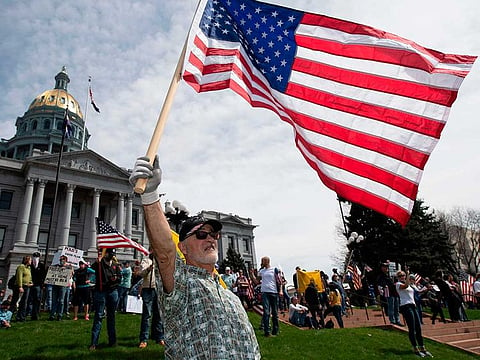Looking at the twilight of America’s exceptionalism
Around 30 million have been laid off and are surviving on unemployment benefits in the US

What happens in Vegas stays in Vegas, true, but the tagline does not apply to Washington, where what happens there echoes around the world, profoundly impacting the socio-political destiny of countless peoples around the world, including our own part of it in the Middle East.
In short, the well-known maxim, that when America sneezes, the rest of the world catches cold — a variation on Austrian diplomat Klemet von Metternich’s own maxim about Napoleonic France — holds here.
Declinists’ theories about the putative decline and fall of American power, which have been part of the public discourse since the 1970s, may be old hat, but there has never been a time in modern American history when Americans — a people as intimate with and self-assured about their sense of exceptionalism as they are with their own skin — felt, as they do these days, that their future has switched from being a promise to being a threat.
The question that caps all questions today, one that concerns everyone around the globe, not least that part of it Arabs inhabit, is this: What kind of world shall we be looking at, after all has been said and done, with a diminished America in it?Fawaz Turki
Coronavirus has ravaged the lives and livelihood of Americans everywhere and wrecked their economy as the ground beneath it appears to have buckled.
Grim milestones
Last week, the country reached the grim milestone of 4 million infections and 150,000 deaths, a grimmer milestone than any reached elsewhere in the world. Florida, for example, a state with a population of 21 million, registered more new cases than all the countries of the European Union, with a population of 460 million.
Around 30 million workers have been laid off and are surviving on unemployment benefits, comparable to applying a band-aid to a bullet wound.
Also Read: COVID-19: America’s war with masks
Also Read: A cult of selfishness is killing America
Americans — millions of Americans — are hanging by a thread. The number of people filing for unemployment benefit claims has kept edging up and up since March. Food banks are overwhelmed. And, even more tragically, as the federal government’s bans on evictions from homes for failure to pay rent, or closure on them for failure to pay mortgage, end soon, cities are expected to be swamped by a wave of homelessness.
Yes, all this is happening in America, a nation that people around the world had, since the beginning of the second half of the last century, seen as the epicentre of wealth, power and — that captivating third leg of the tripod — pop culture.
As characteristics that had once defined America as “leader of the free world” disappear, Gallup’s pollsters have reported, not surprisingly, that worldwide approval of US stewardship has plunged from 48 per cent in 2016 to a record low of 27 per cent in 2019, in part, perhaps mostly, due to the current leadership’s isolationist, erratic America First policy.
Perilous times for America
These are perilous times for America, once a mighty hegemon seen by one and all as an indispensable nation that defined the nature, tone and direction of the global dialogue of cultures, but is now seen by its erstwhile allies as a bumbling, unreliable partner — and it is all taking place at a time when Americans across the board are reckoning both with the pandemic, which has significantly impacted their lives, and with racial injustice, which has bedevilled their society for generations.
It appears that the sense of exceptionalism that had defined America’s national character at home and its hubris abroad has had its day. Now that sense of triumphalism is having its eclipse.
To be sure, that exceptionalism, the theory that America is different, indeed superior to other nations, with a unique mission to transform the world into its own image, has always been smoke and mirrors, a self-centred paradigm much akin to mysticism, a discipline that begins in mist and ends in schism. But there you have it.
The question that caps all questions today, one that concerns everyone around the globe, not least that part of it Arabs inhabit, is this: What kind of world shall we be looking at, after all has been said and done, with a diminished America in it?
Search me! Predicting such a future, anchored as it is in so many variables, is a fools errand. This, however, we know: The America of yore will soon become a fable, or at the very least a parody of its old self — even after the virus had been tamed and those, who had fallen prey to the lure of authoritarianism and elected a white nationalist to lead them, switch sides when they go to the polls next November.
Meanwhile, who would have thought that America would be brought to its knees by, well, both a “person, man, woman, camera, TV”, and a virus that, on a nanoscale, measures one thousandth the width of an eyelash? To subvert a proverb, that’s food for thought about the ridiculous and the sublime, wouldn’t you say?
— Fawaz Turki is a journalist, lecturer and author based in Washington. He is the author of The Disinherited: Journal of a Palestinian Exile.
Sign up for the Daily Briefing
Get the latest news and updates straight to your inbox








